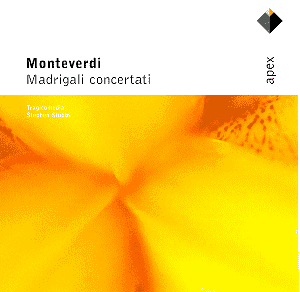Now that Warner have
taken all of their various classical
labels and put them under one generic
heading of Warner Classics, they are
reissuing fantastic recordings at a
blinding pace under their Apex banner.
Perhaps this is an attempt to give Naxos
a run for their money, and if this is
the case, they will probably not succeed,
as their repertoire is still not as
extensive, varied or risky. Nonetheless,
they are putting out a slew of very
nice performances at a very nice price,
and this disc of Monteverdi madrigals
is a very fine choice indeed.
Claudio Monteverdi,
who was the co-inventor of not only
opera, but of the style of composition
that would come to be known as baroque
as well, was arguably one of music’s
most original voices. Although he had
students and imitators in the likes
of composers as fine as Heinrich Schütz
and Herrmann Schein to name just two,
no composer until perhaps Mendelssohn
was to have a method of combining voices
to such utterly stunning effect. The
selections on this disc come from the
seventh and eighth books of madrigals.
Differing widely from the traditional
four to five part settings common at
the time, these works are truly vocal
concerti, scored for anything from one
to six voices with basso continuo. They
possess some of the most acrobatic and
technically difficult vocal writing
of any music written before or since.
Of paramount importance to Monteverdi
was his philosophy that music was the
handmaiden of words, and not the other
way round. He certainly achieved his
goal in this spectacular and colorful
music.
These performances
by the members of Tragicomedia are superb
in all respects. Of the many things
that impressed me about this recital,
it is perhaps the intensity charged
singing of tenors John Potter and Douglas
Nasrawi. Although both of these gentlemen
are possessed of splendid and lovely
instruments, they are not afraid to
sacrifice sheer beauty of tone every
now and again to achieve a heightened
sense of drama. That is certainly not
to say that their singing is in any
way unattractive. Rather, it is to praise
these singers for first and foremost
using their instruments to serve the
music, and to communicate it in a way
that is not only delightful to the ear,
but captivating to the mind and heart
as well. These are truly singing actors,
and their conveyance of these magnificent
poems is attention grabbing at the least,
breathtaking at its peak.
Viveca Axell turns
in a simply ethereal performance of
the haunting Lamento della ninfa,
aptly accompanied by her male colleagues.
And, lest I slight another fine singer,
bass Harry van der Kamp is also practically
without flaw. His picturesque text painting
and his careful attention to the conveyance
of the poetry is a rarity amongst a
crop of ‘early music’ singers who often
ignore musical expression for some idealized
affected production technique that wears
thin very quickly in most every case.
More significantly, none of these singers
fall into the typical trap that I like
to call "monopretty," meaning
that the listener is subjected to seventy
plus minutes of the loveliest but utterly
expressionless singing imaginable, all
in the name of authenticity.
Apex have included
a good program note and full texts and
translations, a must for a recording
of this type, and much appreciated.
There is a problem however with the
packaging in general though, in that
the bright yellow cover with white minuscule
type on the back plate is nearly impossible
to read. Black ink is a good thing.
Excellent sound quality
and a bargain price make this reissue
a winner on all counts. Very highly
recommended indeed.
Kevin Sutton
